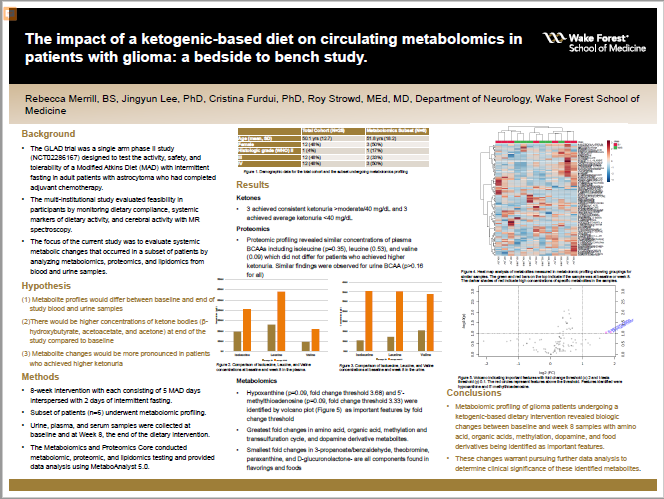Your message has been sent.
 CLOSE SIDEBAR
CLOSE SIDEBAR

The impact of a ketogenic-based diet on circulating metabolomics in patients with glioma: a bedside to bench study.
Rebecca Merrill
Poster Title: The impact of a ketogenic-based diet on circulating metabolomics in patients with glioma: a bedside to bench study.
Student: Rebecca Merrill, Class of 2024
Faculty Mentor and Department: Roy Strowd, MEd, MD, Neurology
Funding Source: Kulynych Family Funds for Medical Research in Honor of Timothy C. Pennell, MD
ABSTRACT
Background: Malignant gliomas are a type of primary brain tumor that have limited treatment options and high rates of morbidity and mortality. The GLAD trial was a single arm phase II study (NCT02286167) designed to test the activity, safety, and tolerability of a Modified Atkins Diet (MAD) with intermittent fasting in adult patients with astrocytoma who had completed adjuvant chemotherapy. The multi-institutional study evaluated feasibility in participants by monitoring dietary compliance, systemic markers of dietary activity, and cerebral activity with MR spectroscopy. The study completed enrollment in 2019 and results of initial MR spectroscopy studies as well as results of the primary and key secondary outcomes have been published1,2. The focus of the current study was to evaluate systemic metabolic changes that occurred in a subset of patients by analyzing metabolomics, proteomics, and lipidomics from blood and urine samples.
Hypothesis: We hypothesized that (1) metabolite profiles would differ between baseline and end of study blood and urine samples, (2) there would be higher concentrations of ketone bodies (β-hydroxybutyrate, acetoacetate, and acetone) at end of the study compared to baseline and (3) metabolite changes would be more pronounced in patients who achieved higher ketonuria (a marker of systemic dietary activity).
Methods: The GLAD study consisted of an 8-week intervention with each consisting of 5 MAD days interspersed with 2 days of intermittent fasting. At the WFSM site, a subset of patients (n=6) underwent metabolomic profiling. Urine, plasma, and serum samples were collected at baseline and at Week 8, the end of the dietary intervention. Plasma (4-5mL) and urine (5mL) were collected at each time point Samples were stored frozen in the Clinical Research Unit until testing. The Metabolomics and Proteomics Core at Atrium Health Wake Forest Baptist conducted metabolomic, proteomic, and lipidomics testing and provided data analysis using MetaboAnalyst 5.0.
Results: The total cohort consisted of 25 patients; mean age 50.1 years, 48% female, 48% grade 3, 48% grade 4, and 100% completed concurrent chemotherapy. The metabolomics subset included 6 patients with similar mean age 51.8 years, 50% female, 33% grade 3, 50% grade 4, and 100% completing concurrent therapy. In this subset, 3 achieved consistent ketonuria >moderate/40 mg/dL and 3 achieved average ketonuria <40 mg/dL. Proteomic profiling at baseline and Week 8 revealed similar concentrations of plasma branched chain amino acids including isoleucine (p=0.35), leucine (0.53), and valine (0.09) which did not differ for patients who achieved higher ketonuria. Similar findings were observed for urine BCAA (p>0.16 for all). Metabolomic profiling showed the greatest fold changes in amino acid, organic acid, methylation and transsulfuration cycle, and dopamine derivative metabolites. Those identified with the smallest fold change- 3-propanoate/benzaldehyde, theobromine, paraxanthine, and D-glucuronolactone- are all components found in flavorings and foods. Hypoxanthine (p=0.09, fold change threshold 3.68) and 5’-methylthioadenosine (p=0.09, fold change threshold 3.33) were identified by volcano plot as important features by fold change threshold. Heat map analysis of metabolomics profiling showed a grouping of similarities for 3 patients at week 8 with further investigation into groupings ongoing.
Conclusions: Metabolomic profiling of glioma patients undergoing a ketogenic-based dietary intervention revealed biologic changes between baseline and week 8 samples with amino acid, organic acids, methylation, dopamine, and food derivatives being identified as important features. These changes warrant pursuing further data analysis to determine clinical significance of these identified metabolites.
Source of mentor’s funding or other support that funded this research:
(1)BerringtonA, Schreck KC, Barron BJ, et al. Cerebral Ketones Detected by 3T MR Spectroscopy in Patients with High-Grade Glioma on an Atkins-Based Diet. AJNR Am J Neuroradiol. 2019
(2) Schreck KC, Hsu F, Berrington A, Henry-Barron B, Blair L, Hartman A, Kossoff E, Easter L, Self M, Whitlow CT, Barker PB, Cervenka MC, Blakeley JO, Strowd RE. Feasibility and biologic activity of a ketogenic/intermittent fasting diet in glioma patients. 2020
Powered by Acadiate
© 2011-2024, Acadiate Inc. or its affiliates · Privacy
